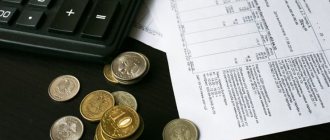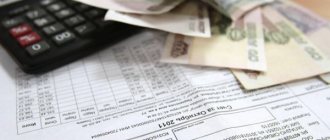Subject to residence, if no one is registered in the apartment, how to calculate the rent? This issue causes difficulties for citizens, since not everyone understands why they regularly pay receipts and why the amount may be increased. Misunderstandings especially often occur if no one is registered in the apartment. Should the owner pay rent for an apartment, register someone in it when there are no such people, and will the rent, in principle, be calculated if no one is registered? These are the questions that need to be answered.
If no one is registered in the apartment, what does the owner pay?
If no one is registered in the apartment, this does not exempt the homeowner from paying various utilities. However, if he is absent for a long period of time, he may request a recalculation.
Some services are subject to mandatory payment. Among them:
- centralized heating (in the absence of heat meters);
- repair and maintenance of a residential building and the surrounding area;
- use of the elevator;
- payment for intercom if the apartment has a dedicated communication line.
As for services such as water supply, electricity and sewerage, payment will be made based on current meter readings.
Non-privatized housing
If the user lives in a non-privatized apartment, its actual owner is the state represented by a specific municipal structure. Such users do not pay for the maintenance of the house and do not bear the cost of repairs, but are forced to pay the state according to the rental agreement.
As for other utility expenses, they are paid on the basis of data from meters, or according to current standards if there are no meters.
Privatized apartment
Accrual of various payments for used utility resources is made in the name of the current owner of the living space. The accrual occurs from the moment he took ownership and registered his property properly.
If for some period of time the owner of a privatized apartment is actually absent, he has the right to demand from the Housing Office a recalculation for the period when he was absent.
If there is registration
In most cases, apartments are purchased for the purpose of further living in them. After registering the property, the owner can register in the premises himself and register his relatives and friends there. The number of registered residents affects the final amount of rent in terms of utility bills. There are two main strategies for calculating payouts:
- In the absence of individual metering meters, the number registered is taken into account; the more there are, the higher the payments
- If metering devices are available, calculations are made for actually consumed resources
Individual metering meters can significantly reduce utility bills. The fact is that in their absence, payments are charged according to average rates per person. These figures are usually quite inflated when compared with actual consumption, which is why you end up paying more.
Based on the number of registrations, the removal of household waste will be paid. There are also items in the rent that do not depend in any way on the people living, but are calculated based on the square footage of the premises. These include:
- Maintenance of common areas
- Major renovation of the building
Also, amounts may be withheld from the owner for cleaning entrances and surrounding areas, security, parking and much more.
How is rent calculated if no one is registered?
The question often arises of how rent is calculated if no one is registered in the premises. According to the current rules of law, the absence of registered citizens in the apartment is not grounds for exemption from paying utility bills. However, when calculating rent, some fundamental parameters will be taken into account.
In general, the rent for housing in which no one is registered is calculated as follows:
- Some payments will be mandatory and cannot be avoided. We are talking about heating (with the exception of situations where the apartment has a consumption control meter), house maintenance and home repairs, as well as contributions to the capital fund. Even if the consumer is absent for some time, he will still have to make the specified payments.
- Without meters for gas, water and electricity, the user will pay according to current standards, multiplied by the increase factor. Thus, the amount to be paid will be an order of magnitude higher than that of neighbors who have meters.
- When metering devices are installed, payment for resources such as water, gas and electricity is calculated depending on the current meter readings. If the user did not use utility resources, he will not pay anything.
The legislative framework
Legislation on the procedure for calculating payments for the provision of housing and communal services
The procedure for paying for the maintenance of living space and the use of housing and communal services is based on two codes of Russia: Housing and Civil.
The first determines the system of utility charges, their size and the legal obligations of homeowners.
Based on the second, cases of the emergence of the right to own residential premises are determined, as well as the period from which the obligation to pay for the maintenance of real estate appears.
According to Article 153 of the Housing Code, owners of residential premises are obliged to pay for their maintenance and utilities on time and in full.
In the Housing Code you can find the following:
- what charges are legal (Article 154);
- what payment rules are established by law (Article 155);
- what amount of payment and form is acceptable (Articles 156 - 157);
- what expenses are required to be borne by property owners in apartment buildings (Article 158);
- who can count on what benefits and subsidies when paying for housing and communal services (Articles 159-160).
Questions related to the payment of utility bills in the absence of registered ones in the apartment most often arise among new owners of residential premises, after:
- equity participation in the construction of new housing and before registration of its ownership;
- acquiring or obtaining additional living space in which no one lives;
- moving from old housing and canceling registration in it.
The grounds after which the obligation to maintain real estate passes to the new owner are also described in Article 153:
- the owner is burdened with these obligations from the date of registration of the right indicated in the certificate of ownership of real estate (Civil Code of the Russian Federation, Art. 219);
- employers, from the moment of execution of the rental agreement (Civil Code of the Russian Federation, Chapter 34);
- tenants, from the moment of execution of the lease agreement (Civil Code of the Russian Federation, Chapter 35);
- owners of premises received from developers - after drawing up a transfer and acceptance certificate (Civil Code of the Russian Federation, Art. 556);
- participants of residential cooperatives from the date of provision of the property (RF Housing Code Art. 124).
From the moment the owner of a residential premises moves into it or becomes the owner by law, he is obliged to bear the costs of maintaining the apartment, regardless of whether anyone is registered there or not. It also doesn’t matter whether the premises are residential or temporarily empty.
If the premises are located in an apartment building, the owner is required to pay for the maintenance and repair of common property in the part determined by his share.
If meters are not installed
Many users have a question about how to pay for utilities if meters are installed in the apartment, or if they are missing. Thus, the legislator answers this question unequivocally: if there is an accounting device, all accruals will be made based on their specific indicators on a certain date.
However, if there are no meters in the apartment, then charges will be made based on the area of the apartment, as well as the number of persons officially registered in the living space.
If for some reason no one lives in the apartment, in order to be exempt from payments you will need to contact the management company or housing office and provide them with confirmation of the consumer’s absence indicating specific time periods.
How to pay for water
If a consumer does not live in the living space registered in his name for a certain period of time, he has the right to submit the appropriate documents to the housing office or management company so that any charges for water supply and sewerage are removed from him.
It is much easier if the apartment has water meters. In such a situation, payment will occur based on the indicators of the meter for a specific period of time.
Payment for gas if
In recent years, in many apartments, specialized devices have been installed to measure the amount of heat consumed. If there are such meters in your apartment, the consumer will have to pay based on the indicators of the meter.
If there is no heat meter, it will not be possible to avoid payment, since the accrued payment is carried out taking into account the total area of the housing.
Electricity if
When connecting electricity to an apartment, a mandatory metering device is always installed, which records the amount of resource used. Because here everything will be much simpler. If there is a counter, accruals will be made solely taking into account the indicators for the current period.
If the consumer did not use electricity, therefore, he will not pay anything. It will be a completely different story if we are talking about a communal apartment or dormitory. If there is no electricity meter, a specific amount is charged, calculated based on the area of the home and the number of registered citizens.
Public utilities
If there are no meters, it is also possible to stop paying for services intended for the convenience of living. In this case, it is necessary to prove that no one lives in the apartment and, accordingly, does not use the resources. You can do this in several ways:
- Disable resource access to the premises if the owner of the premises lives at a different address and no one else lives in the apartment.
- Suspend accruals temporarily for the period of absence, documenting it
In both cases, you should contact the housing company with an application and a document proving ownership of the property. If the owner of the apartment is registered in another place where he pays for utilities, he should provide a certificate of registration and receipts for payment of resources at the place of residence.
Invoices for garbage removal at the location of the apartment in which no one lives or is registered will be sent automatically. It is not possible to cancel these accruals upon application. This can only be done by proving that this service is paid for by the citizen in another place, that is, at the place of actual registration.
It is impossible to stop charging for heating and turn it off under any circumstances. The only option to reduce the bill occurs if the heating source is located in the apartment, and it is possible to adjust the heating temperature. Minimum values will allow you to pay less.
Complete shutdown of equipment in winter is impossible, as it will damage the overall heating system and the entire building.
Often, disputes regarding payment for housing and communal services arise during shared construction during a period when the apartment has already been transferred to the owner, but a certificate of ownership has not yet been received. Owners of such apartments should remember that in their case, the law establishes the obligation to pay for the maintenance of the apartment from the moment the property is transferred.
The date of occurrence of obligations is considered to be the date of the transfer deed signed by the apartment owner and the developer. Until this document is signed, the burden of paying for housing and communal services is borne by the developer.
Other types of payment for housing and communal services
The current legislative norm means that the consumer will not be able to get rid of paying for some utility services.
In particular, we are talking about services such as:
- payment for maintaining the house and surrounding area in proper order;
- janitor and technical staff services;
- payment for intercom, if the apartment has an appropriate communication channel;
- any additional equipment and technical equipment that will be installed on the basis of a joint decision of the owners, documented in the act of the residents’ meeting.
Subsidies
Subsidy issues are regulated by several regulatory documents. The Housing Code and its articles 159 and 160 are of fundamental importance here. The size of the subsidy depends on the established regional standards, which in turn are based on data from Federal indicators.
However, if the consumer has a subsidy, he can still exercise the right to recalculate if the owner was absent for some time and did not use utility resources.
For the current year, the level of cost of housing and communal services for 1 square of housing is, in accordance with the federal standard, 196.23 rubles (for the Moscow region).
In the regions, these values are calculated on a larger scale, so the figures may vary depending on the specific region of the Russian Federation.
Calculation nuances
The amount of rent for utilities directly depends on the number of persons who are registered on the territory of a certain property. Thus, with an increase in the number of registered citizens, the amount of payment for utilities will also increase, and the only exception to this rule is heating, for which you must pay in accordance with the total area of the premises, and not the number of registered persons.
The presence of people registered in the apartment will affect the amount of payments only for the following utilities:
- Water supply and gas (if appropriate metering devices are not available)
- Electricity (if there are no appropriate metering devices)
- Recycling, cleaning and garbage removal
- Gutter
Considering that over time there has been an extremely stable increase in tariffs, due to which the incomes of most citizens often do not have time to cover the energy consumed, the decision not to register any persons in one’s living space seems quite understandable and justified, even if one has to refuse close relatives.
Among other things, current practice indicates that it is when resolving relationships with relatives that various conflict situations most often arise related to non-payment of utilities, since regardless of who exactly is registered in the house, only the owner is obliged to pay the management company.
Payment details
If a citizen has ownership rights to residential premises that have been properly registered, then this will become the basis for charging utility bills in his name . At the same time, the lack of registration will in no way affect the user’s ability to exempt the user from payments, but will provide him with some mechanisms, using which he will be able to avoid certain payments.
To make the payment, you will need to contact the Criminal Code with an application, passport and documentation that will confirm the applicant’s ownership rights to the housing, and also determine that he is not registered in the apartment, since in fact they live with their family in another place. However, in order to convince utility workers of his trustworthiness, he will need to provide an extract from the personal account of another apartment, where there will be no debts on housing and communal services.
In such situations, the user will be able to exempt himself from paying for sewerage and water supply. But even here there will be some subtleties. If the apartment has metering devices, the utilities will depend on their indicators. If there are no metering devices, then charges will be made based on the area of the housing.
Payment in the absence of IPU
In the absence of individual metering devices, monthly payments are calculated according to the general scheme:
1 average * number of registered.
Average values are calculated individually for each resource - gas, cold and hot water. Gas consumption is calculated separately for rooms where only a gas stove is used and those living spaces where it is needed for heating water or heating. When it comes to water supply, the nuances of ownership may be taken into account. For example, in private homes, cold water tariffs may rise during the summer. This is due to the need to water the land and, as a rule, significantly increase consumption.
Where to go for recalculation
If the consumer has a need to adjust data on the actual level of consumed resources, he will have to visit the management company, housing office or other authority charged with charging for utility services.
All changes to payment documentation must be made within 5 days from the date of application. However, before this, the applicant will need to write a corresponding application for recalculation and provide a number of documentation.
Let us note one important nuance. An application for recalculation is submitted no later than 30 days after the end of the period of absence of the consumer.
Penalties and fines
In connection with the changes that were made to the current legislation in 2021, the procedure for calculating penalties has undergone certain changes if a person violates the established deadlines for calculating payments for utility or housing services provided to him.
The calculation of penalties will begin from 31 days after the debt arose, that is, a person has a month to pay for the services provided to him without fear of the possible imposition of appropriate fines on him.
In the first three months, penalties are accrued in accordance with the original amount of debt, on which interest is applied in the form of 1/300 of the refinancing rate adopted by the Central Bank. If a person does not pay the existing debt during this period of time, then the amount of the penalty will increase significantly, and the amount of debt will already be multiplied by a percentage in the form of 1/130 of the specified refinancing rate.
Thus, in 2021, by law, the amount of penalties accrued in case of late payment of utility services has increased significantly, and the need to repay debt as soon as possible has become even more urgent.
Documents for application
An application for recalculation must be supported by documentary evidence. In particular, at the highest state level, a specific list of documentation is prescribed that may be requested by employees of the housing office or management company:
- owner's passport (original and copy);
- legal documentation for residential premises;
- a certificate of the actual absence of the consumer, which will help establish during what time periods he was absent;
- a document confirming information about the composition of the owner’s family and the place of registration of each of them;
- an extract from the personal account, with the help of which the applicant can prove that he paid utility bills on time.
Should non-residents pay?
Often, when paying utility bills, residents doubt whether they should pay for people who are registered in the apartment, but actually live elsewhere. To answer, you must first assess whether these people really influence the amount of payments. If the premises have all meters, then such residents are not reflected in the final amount of the rent.
Please note that when registering temporarily, a certificate issued at the place of residence is the basis for not charging utility bills to the address of permanent registration.
Uninstalled metering meters can negatively affect the size of the communal apartment for those owners who have registered property owners who do not actually live in it. But for the resource provider, the presence or absence of a tenant does not play any role - he owns his money
In a privatized apartment
Rent in privatized housing is borne by the owner of the premises or distributed among co-owners, provided that they have divided personal accounts. It doesn’t matter who is registered in the premises, who lives or does not live in it, all responsibility falls solely on the owner.
It is he who enters into contracts with suppliers of electricity, gas, hot and cold water. For this reason, he will have to be responsible for expenses and timely payments.
If a tenant is registered but does not live, then utility bills will not be charged for him in the following cases:
- Metering devices installed
- The person is registered temporarily at another place of stay
You can also recalculate if there are papers proving the person’s absence, for example, sick leave, travel documents, etc.
In a municipal apartment
Municipal real estate is not the property of residents, but belongs to the state. While living in such apartments, registered residents are exempt from payments for the maintenance and repair of the house, but are required to pay the amounts established under the rental agreement. As for utility bills, they are calculated in the standard way:
- By counters
- Based on average consumption per resident
Actual non-occupancy does not relieve the registered person of responsibility for timely payment, especially since in municipal property all residents have equal rights and responsibilities.
Registering a child in a “zero” apartment
According to Art. 20, the place of residence of a Russian minor must be the place of residence of his legal representatives
- parents,
- guardians,
- trustees.
Therefore, in order to register a child in an apartment where no one is registered, you must first (or simultaneously) register his mother or father at this address.
How to deposit money
Every apartment owner should know how to pay utilities for their home. For non-payment or late payments, penalties are imposed on the owner of the premises. Only timely payment of funds for services supplied by utility companies can guarantee the uninterrupted supply of these services to a person.
ATTENTION! Late or incorrect payment for housing and communal services may lead to their suspension for the consumer.
The owner of the apartment pays for the utilities himself, even if the premises are rented out. All details must be specified in the lease agreement.
The deadline for making payments under the Housing Code must be made by the 10th day of each month. Representatives of management companies are required to provide the apartment owner with the appropriate receipts to repay the amount for the use of housing and communal services.
The legislation does not exempt the apartment owner from paying utility bills, even if he does not live in the home. However, not all services will be charged.
The procedure for paying off a utility bill is very simple, but some people still wonder how to do it correctly . Payments are made in cash or by bank transfer.
Before depositing money, you must review the receipt. To avoid fines, payment should be made after receiving a notice with the prescribed amount.
You can pay for utilities at post offices, banks, or directly at the supplying organization. You can deposit funds into the account of supplying companies by bank transfer using ATMs, electronic payment systems, and mobile payments. This method of depositing funds is relevant for young people who understand modern technologies.
You can make a payment in cash using the terminal. The device is similar in appearance to an ATM, and payment is made by depositing funds into a special acceptor for banknotes. This method of paying off utility bills saves people from queuing at the box office.
After completing the procedure, the person will receive a check from the terminal, which should not be thrown away, because it serves as confirmation in case of disputes.
Where to recalculate
To recalculate, you need to contact the company that supplies this or that resource. For example, to avoid paying for water, visit the Vodokanal branch. But now management companies or HOAs are intermediaries between residents and resource providers, so it is necessary to submit a package of documents either to the management company or to the accounting department of the HOA. In large cities there are still unified settlement centers that also accept applications for recalculation.
Necessity
Residents of multi-apartment buildings are required to pay for utilities, which include:
- electricity bill . For residents, it is calculated based on meter readings or an average;
- use of electricity in common areas (hallways). Residents share this payment equally;
- payments for hot and cold water . In this case, the hot water indicator should not be lower than +40 degrees. Payment for preliminary water purification is also charged. Calculations are made using the average or meter data;
- heating fee, the indicator of which should not be lower than + 18 degrees. The calculation of the payment amount depends on the area of the apartment and amounts to 43 rubles per 1 sq. m. meter. The total cost includes payment not only for heat in housing, but also for its supply to common areas;
- garbage removal . The charge for such a service depends on the area of the home and the volume of waste removed;
- sewerage fee . The calculation takes into account the type of sewage system and its level of pollution.










